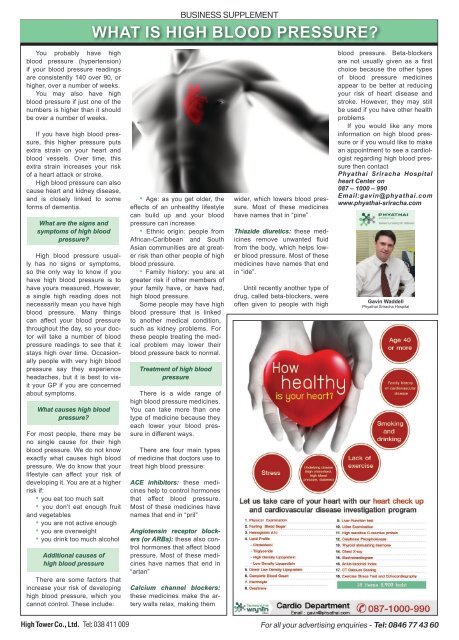BBS AUG 18
You also want an ePaper? Increase the reach of your titles
YUMPU automatically turns print PDFs into web optimized ePapers that Google loves.
BUSINESS SUPPLEMENT<br />
WHAT IS HIGH BLOOD PRESSURE?<br />
You probably have high<br />
blood pressure (hypertension)<br />
if your blood pressure readings<br />
are consistently 140 over 90, or<br />
higher, over a number of weeks.<br />
You may also have high<br />
blood pressure if just one of the<br />
numbers is higher than it should<br />
be over a number of weeks.<br />
If you have high blood pressure,<br />
this higher pressure puts<br />
extra strain on your heart and<br />
blood vessels. Over time, this<br />
extra strain increases your risk<br />
of a heart attack or stroke.<br />
High blood pressure can also<br />
cause heart and kidney disease,<br />
and is closely linked to some<br />
forms of dementia.<br />
What are the signs and<br />
symptoms of high blood<br />
pressure?<br />
High blood pressure usually<br />
has no signs or symptoms,<br />
so the only way to know if you<br />
have high blood pressure is to<br />
have yours measured. However,<br />
a single high reading does not<br />
necessarily mean you have high<br />
blood pressure. Many things<br />
can affect your blood pressure<br />
throughout the day, so your doctor<br />
will take a number of blood<br />
pressure readings to see that it<br />
stays high over time. Occasionally<br />
people with very high blood<br />
pressure say they experience<br />
headaches, but it is best to visit<br />
your GP if you are concerned<br />
about symptoms.<br />
What causes high blood<br />
pressure?<br />
For most people, there may be<br />
no single cause for their high<br />
blood pressure. We do not know<br />
exactly what causes high blood<br />
pressure. We do know that your<br />
lifestyle can affect your risk of<br />
developing it. You are at a higher<br />
risk if:<br />
• you eat too much salt<br />
• you don’t eat enough fruit<br />
and vegetables<br />
• you are not active enough<br />
• you are overweight<br />
• you drink too much alcohol<br />
Additional causes of<br />
high blood pressure<br />
There are some factors that<br />
increase your risk of developing<br />
high blood pressure, which you<br />
cannot control. These include:<br />
• Age: as you get older, the<br />
effects of an unhealthy lifestyle<br />
can build up and your blood<br />
pressure can increase.<br />
• Ethnic origin: people from<br />
African-Caribbean and South<br />
Asian communities are at greater<br />
risk than other people of high<br />
blood pressure.<br />
• Family history: you are at<br />
greater risk if other members of<br />
your family have, or have had,<br />
high blood pressure.<br />
Some people may have high<br />
blood pressure that is linked<br />
to another medical condition,<br />
such as kidney problems. For<br />
these people treating the medical<br />
problem may lower their<br />
blood pressure back to normal.<br />
Treatment of high blood<br />
pressure<br />
There is a wide range of<br />
high blood pressure medicines.<br />
You can take more than one<br />
type of medicine because they<br />
each lower your blood pressure<br />
in different ways.<br />
There are four main types<br />
of medicine that doctors use to<br />
treat high blood pressure:<br />
ACE inhibitors: these medicines<br />
help to control hormones<br />
that affect blood pressure.<br />
Most of these medicines have<br />
names that end in “pril”<br />
Angiotensin receptor blockers<br />
(or ARBs): these also control<br />
hormones that affect blood<br />
pressure. Most of these medicines<br />
have names that end in<br />
“artan”<br />
Calcium channel blockers:<br />
these medicines make the artery<br />
walls relax, making them<br />
wider, which lowers blood pressure.<br />
Most of these medicines<br />
have names that in “pine”<br />
Thiazide diuretics: these medicines<br />
remove unwanted fluid<br />
from the body, which helps lower<br />
blood pressure. Most of these<br />
medicines have names that end<br />
in “ide”.<br />
Until recently another type of<br />
drug, called beta-blockers, were<br />
often given to people with high<br />
blood pressure. Beta-blockers<br />
are not usually given as a first<br />
choice because the other types<br />
of blood pressure medicines<br />
appear to be better at reducing<br />
your risk of heart disease and<br />
stroke. However, they may still<br />
be used if you have other health<br />
problems<br />
If you would like any more<br />
information on high blood pressure<br />
or if you would like to make<br />
an appointment to see a cardiologist<br />
regarding high blood pressure<br />
then contact<br />
Phyathai Sriracha Hospital<br />
heart Center on<br />
087 – 1000 – 990<br />
Email:gavin@phyathai.com<br />
www.phyathai-sriracha.com<br />
Gavin Waddell<br />
Phyathai Sriracha Hospital<br />
High Tower Co., Ltd. Tel: 038 411 009<br />
For all your advertising enquiries - Tel: 0846 77 43 60

















